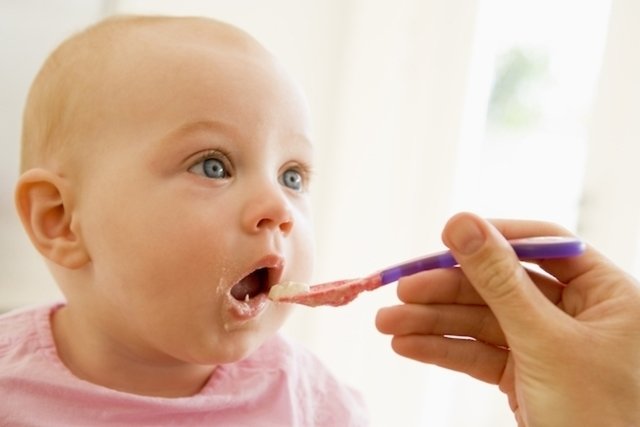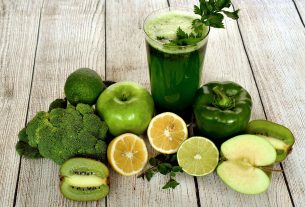Until 6 months of age, it is not recommended to add foods or liquids to the baby’s diet other than breast milk. However, even after 6 months, when other foods can begin to be introduced into the diet, it is important to avoid processed foods such as cookies, snacks and soft drinks, as they have low nutritional value.
Furthermore, as your baby is still learning to chew and often swallows whole pieces of food, it is important to avoid very small and hard foods. Other foods, such as honey and cow’s milk, are also not recommended for children under 12 months, as they can cause health problems.
To ensure a healthy diet that does not pose any risks to the baby’s health, it is important to consult a pediatrician, who can advise which foods are best suited according to the child’s stage of development.

Foods to avoid up to 1 year of age
The main foods that should be avoided in the first year of life include:
1. Mel
Honey is contraindicated for babies up to 1 year of age, as it may contain the bacteria Clostridium botulinumwhich releases toxins into the intestine causing botulism, which brings complications such as difficulty swallowing, breathing and moving, which can lead to death.
This happens because the baby’s intestinal flora is not yet fully formed and strengthened to fight the foreign microorganisms that contaminate this food, making it important to avoid using any type of honey.
2. Salt and other processed seasonings
It is recommended to avoid adding salt to baby’s meals until 12 months and, after that age, although it can already be consumed by the child, salt should be added in moderation. Furthermore, other seasonings considered processed, such as ready-made ones, although they contain natural ingredients, should also be avoided because they may contain other ingredients such as salt and preservatives.
This recommendation is important because a diet with salt or processed seasonings can overload the developing kidneys and cause difficulty in digestion and absorption of nutrients.
3. Cow’s milk
Cow’s milk should be avoided in children during the first year of life because it is linked to a greater risk of digestive bleeding, if there is an allergy, or anemia, as it reduces iron absorption. Furthermore, cow’s milk contains proteins and minerals in very high quantities, which can overload the kidneys at this age, making it unsuitable for babies.
4. Fruit juices
Fruit juices should be avoided before 12 months because they can reduce appetite, causing the baby to consume less foods with greater nutritional value, such as breast milk, infant formula and baby food, which are more important for healthy growth and development.
Even after 12 months, it is important to limit the consumption of juices and prefer 100% natural and pasteurized options, to avoid microorganisms that can cause diseases such as diarrhea and parasites.
Foods to avoid until 2 years of age
Foods that should be avoided by babies under 2 years old include:
1. Sweets
Sweets are foods rich in calories, poor in nutrients and contain large amounts of sugar, fat and preservatives in their composition, increasing the risk of obesity, in addition to harming the health of the baby’s teeth. Therefore, it is important to avoid giving sweets, such as candies, chocolates, ice cream, condensed milk and cakes.
Additionally, many candies are small and hard, increasing the risk of choking and suffocation hazards. Even though children are already able to chew and swallow other foods, the risk of this happening remains high.
2. Chocolate milk
Chocolate drinks are rich in sugar and increase the risk of overweight and obesity. Although they can be enriched with vitamins and minerals, chocolate drinks are unsuitable for consumption up to 2 years of age, as they can make the baby less willing to eat more nutritious foods such as fruits and vegetables.
3. Soft drinks
Soft drinks contain large amounts of sugar, sodium and may also contain caffeine and other ingredients such as preservatives and colorings, which can harm the baby’s health, promote the appearance of cavities and increase the risk of overweight and obesity in children.
Furthermore, the caffeine present in soft drinks can cause agitation, difficulty concentrating and harm the baby’s sleep.
4. Unnatural or powdered juices
Juices that are not 100% natural and powdered juices are rich in salt, sugar, and products such as colorings, flavorings and preservatives, which in addition to having no nutritional value, can harm the kidneys, teeth and increase the risk of obesity in infancy.
5. Stuffed cookies
Filled cookies are nutritionally poor foods and rich in sugar and fat, ingredients that can increase the risk of problems such as obesity and diabetes. Additionally, stuffed cookies may also contain cholesterol and trans fats. Just one cookie is enough to exceed the daily fat recommendations for your baby.
6. Processed meats
Processed meats and sausages such as sausages, sausages, bacon, ham, salami and mortadella are rich in ingredients such as fat, salt, colorings and chemical preservatives.
This type of food has low nutritional value and can overload the kidneys. Additionally, they are more difficult to digest and can cause abdominal pain or discomfort.
7. Packaged snacks
Packaged snacks are rich in salt, fats, colorings and preservatives, which increase the risk of cardiovascular problems, such as high blood pressure or high cholesterol.
As an option, a tip is to make chips at home, using fruits or vegetables that can be dehydrated in the oven or microwave, such as potatoes, sweet potatoes and apples. See how to make healthy sweet potato chips.
8. Industrialized gelatin
Although they contain a large amount of water, industrialized gelatins are also rich in dyes, preservatives and sugar, having little nutritional value for children.
Therefore, an alternative is to make natural gelatin at home, combining fruit juice with a little simple gelatin, which is sold in the form of gelatin sheets and does not contain dyes, flavorings or sugar. However, even gelatin made from juice should also only be offered after the first year of life.
9. Sweeteners
Sweeteners should only be given to children if recommended by a doctor or in cases of diseases such as diabetes. Furthermore, replacing sugar with a sweetener does not help reduce the consumption of sweet foods.
Whenever possible, fresh fruit should be used to sweeten vitamins, milk and yogurt, for example.

Sign up for our newsletter and stay up to date with exclusive news
that can transform your routine!
Warning: Undefined array key "title" in /home/storelat/public_html/wp-content/plugins/link-whisper-premium/templates/frontend/related-posts.php on line 12
Warning: Undefined array key "title_tag" in /home/storelat/public_html/wp-content/plugins/link-whisper-premium/templates/frontend/related-posts.php on line 13



